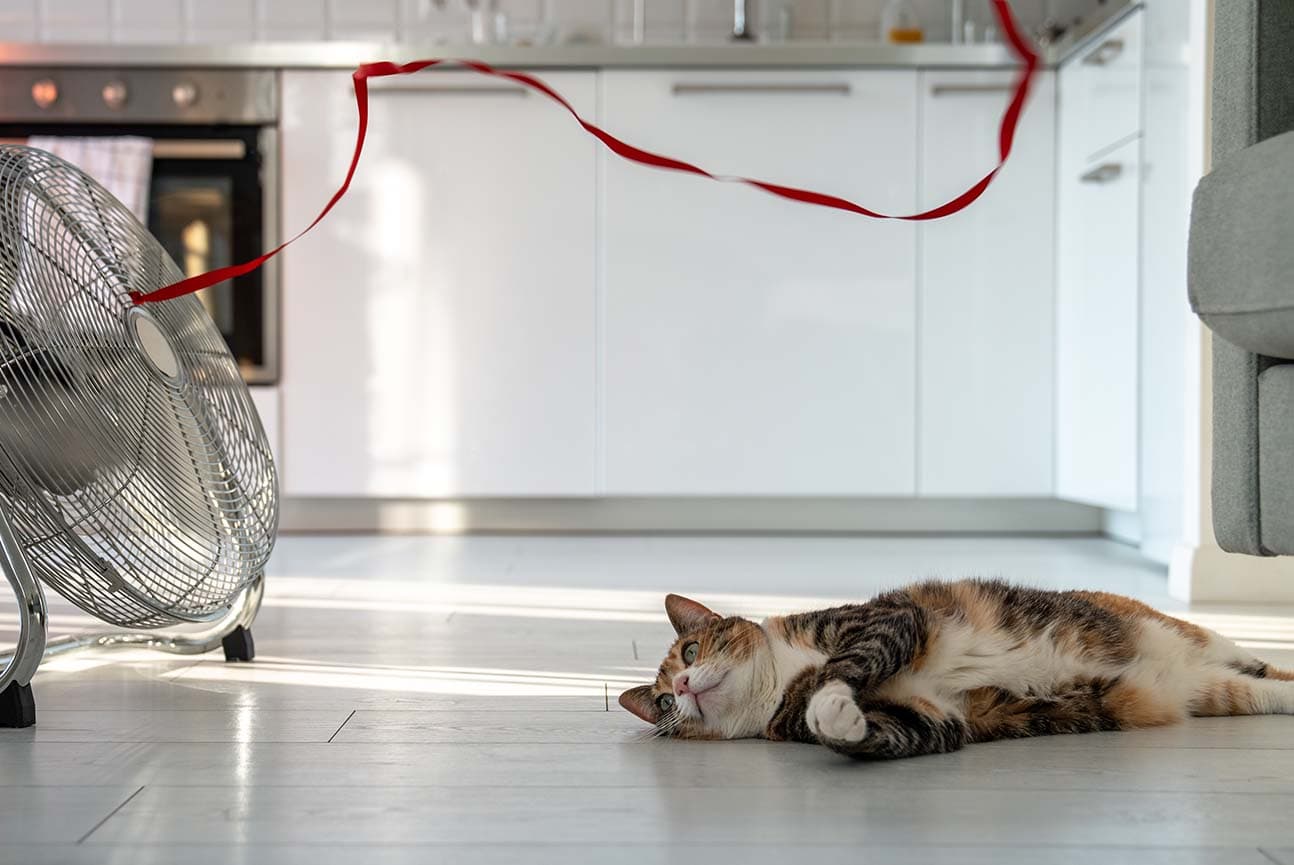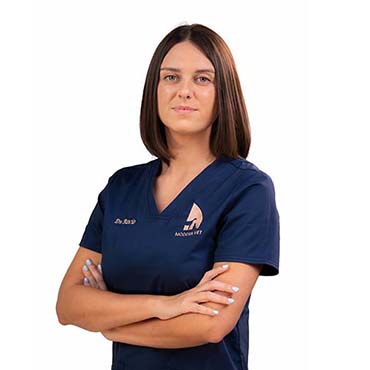Reviewed by Dr. Rocio Mena
Updated on 09/10/2025
Reading time 4 min.
Overview
Severity: Low
Life stage: All
In Dubai’s hot climate, cats are especially prone to dehydration because they naturally drink less water than other animals. Heat and humidity can quickly cause fluid loss, which may lead to serious issues like urinary tract problems or kidney disease. This article will help you spot dehydration early, understand the risks, and keep your cat safe.
What to do if your cat shows signs of dehydration
- Stay calm and ensure they have somewhere cool and shaded to rest, with fresh water nearby. A cool room with air conditioning or a fan is ideal.
- Offer small amounts of fresh, cool water frequently, rather than large quantities at once. If your cat refuses to drink, try adding a small amount of low-sodium chicken broth or tuna water to make it more appealing.
- Monitor how much urine your cat is passing.
- Check for dehydration using the skin tent test: gently lift the skin at the back of your cat’s neck. In a well-hydrated cat, the skin should snap back immediately when you let it go. If it takes longer than two seconds, your cat is likely dehydrated.
- Other signs of severe dehydration are sunken eyes, dry nose, and extreme tiredness.
- Contact your veterinarian immediately if your cat shows signs of dehydration, especially during Dubai’s peak summer months when the risk is highest.
Common causes of dehydration in cats
Environmental factors:
- Prolonged exposure to Dubai’s extreme temperatures
- Overheating from being left in cars or poorly ventilated spaces
- Reduced water intake due to warm water in bowls left in sunny areas
- Sand and dust that can contaminate water sources
- Inadequate access to fresh water throughout the day
Medical conditions:
- Kidney disease
- Diabetes
- Any condition that causes vomiting or diarrhoea
- Urinary tract infections or blockages
- Dental problems that make drinking painful
- Medications like steroids and diuretics
When to seek immediate veterinary attention in Dubai
Emergency signs requiring immediate vet visit:
- Gums that are dry, sticky, or pale instead of moist and pink
- Skin that takes more than 2-3 seconds to return to normal after the skin tent test
- Eyes that appear sunken or lack their typical glimmer
- Lethargy or weakness, especially reluctance to move
- Vomiting or inability to keep water down
Urgent signs during Dubai’s summer months:
- Panting (unusual for cats unless extremely stressed or hot)
- Dark or thick urine
- Loss of appetite for more than 12 hours in hot weather
- Hiding in unusual places or seeking cold surfaces desperately
- Collapse or unresponsiveness
During Dubai’s summer months (May through September), even mild dehydration can progress rapidly due to the extreme heat. When in doubt, it’s best to contact your vet immediately rather than wait.
How to prevent dehydration in Dubai’s climate
Water intake:
- Provide multiple clean water sources around your house to ensure constant access
- Clean out and provide fresh water in bowls every day
- Keep water bowls in shaded, cool areas away from direct sunlight
- Consider using water fountains to encourage drinking through moving water
Environmental controls:
- Maintain air conditioning at comfortable levels (24-26°C) to reduce heat stress
- Create chill zones with proper air circulation where cats can retreat to
- Ensure adequate ventilation in all areas where your cat visits
Dietary considerations:
- Provide moisture-rich diets by adding wet food to daily meals
- Consider offering cat-appropriate electrolyte supplements during particularly hot periods
Daily routine adjustments:
- Regular grooming helps with temperature regulation
- Monitor litter box output to assess hydration levels
Signs of dehydration in cats
- Loss of skin elasticity (skin turgor): Gently lift the skin between your cat’s shoulders, then let go. If it doesn’t go back to normal in under two seconds, dehydration may be present. This test can be less accurate in older cats.
- Dry, sticky, or pale gums.
- A tired, dull or sunken eye appearance can signal dehydration. The third eyelid may become visible.
- Your cat may sleep more, act less playful, or seem generally unsettled.
- Loss of appetite or less frequent urination can be indicators.
In severe cases, dehydration can also lead to rapid breathing, raised heart rate, panting, and sunken eyes. These signs require immediate veterinary care.
Home remedies for mild dehydration
- Move your cat to the coolest area of your home immediately
- Offer small amounts of fresh, cool (not cold) water every 10-15 minutes
- If the cat refuses to drink, you can encourage them by offering the liquid from canned tuna or salmon in spring water
- Lightly wet your cat’s paws and ear tips with cool water to help lower body temperature
- Provide wet food if your cat is eating, as it contains additional moisture
Important limitations: Severe dehydration requires professional veterinary treatment. Home treatment is only appropriate for very mild cases, and you should always contact your vet for guidance, especially during Dubai’s extreme weather conditions.
Vet treatment
Your veterinarian will assess the severity of dehydration using clinical signs and may perform blood tests to check kidney function and electrolyte levels.
Treatment options:
- Subcutaneous fluids for mild to moderate dehydration. Sterile fluids are injected under the skin.
- Moderate to severe cases require intravenous fluid therapy with a drip to rapidly restore hydration.
- Correction of sodium, potassium, and other electrolyte imbalances.
- Cooling measures are taken if overheating contributes to dehydration.
In Dubai’s climate, cats may require extended monitoring to ensure they maintain proper hydration levels once treatment begins.
Your vet may also recommend dietary changes, environmental modifications, or regular check-ups during the summer months to prevent recurrence.
Is your cat at higher risk for dehydration?
- Short-nosed breeds such as Persians may have problems with temperature regulation, increasing the risk of dehydration
- Senior cats (over 7 years) may have reduced kidney function and decreased thirst response
- Kittens have a higher surface area to body weight ratio, which increases heat sensitivity
- Cats with chronic conditions like kidney disease, diabetes, or heart conditions
- Long-haired breeds
- Cats on medications like diuretics and steroids
Dubai-specific risk factors:
- Outdoor cats or those with access to balconies during peak heat hours
- Cats in homes without reliable air conditioning
- Recent arrivals to Dubai who are acclimatising to the extreme climate
- Cats that prefer drinking from outdoor sources that may be contaminated or warm
Expert Veterinary Care in Dubai
Concerned about your cat’s hydration or symptoms? Book a checkup or emergency appointment today at Modern Vet Hospital in Dubai. Their skilled team offers diagnostic services, emergency treatment, and ongoing care tailored to your cat’s needs. Whether it’s a routine visit or urgent care, Modern Vet Hospital is your trusted veterinary clinic in Dubai for thorough, compassionate support.
Share this, choose your platform!
Reviewed by
Dr. Rocio Mena
DVM
Dr. Rocio Mena was born in Spain and discovered her passion for veterinary medicine early in life. She pursued this dream and graduated from CEU University in Spain in 2018 with a degree in…


